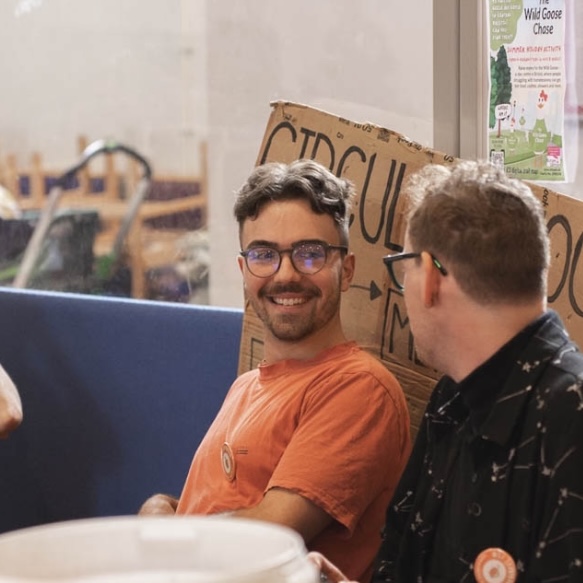What Is Circular Food? How Bristol Is Closing the Loop
- Alex Montgomery
- Nov 19, 2024
- 4 min read
Updated: Dec 26, 2025
The global food system is in crisis. From the depletion of fertile soils to the staggering volume of food waste, it’s clear that our linear “take, make, dispose” model is unsustainable. But there is hope in an alternative: circular food systems. By transforming food production and consumption into a regenerative cycle, circular systems have the potential to restore ecosystems, reduce waste, and promote resilience in our communities. At Generation Soil CIC, we’re passionate about making this vision a reality.
What Is a Circular Food System?
A circular food system redesigns how food moves through society so that resources are continually reused and regenerated rather than wasted.
In a linear system, food is grown, transported, consumed, and discarded. In a circular system, food waste is returned to the soil, nutrients are cycled locally, and the system feeds itself.
A truly circular food system includes:
Waste prevention at every stage
Redistribution of surplus food to feed people
Composting unavoidable food waste into living soil
Regenerative food growing that restores ecosystems
Local supply chains that reduce emissions and build resilience
This approach mirrors natural cycles. Nothing is wasted. Everything has a role.
At Generation Soil, these principles underpin everything we do, from our food waste collection service to our composting hubs and education programmes.

Why the Current Food System Is Failing
Globally, around one third of all food produced is wasted. In the UK alone, millions of tonnes of food end up in bins every year.
When food waste is sent to landfill or processed through industrial systems, it releases methane, a greenhouse gas far more potent than carbon dioxide. At the same time, industrial agriculture continues to strip soils of organic matter, biology, and resilience.
This creates a vicious cycle:
Degraded soil produces less nutritious food
Chemical inputs increase dependence on fossil fuels
Waste is exported away from communities
Nutrients are permanently lost
A linear system externalises damage. A circular system repairs it.
Closing the Loop: Turning Food Waste Into Soil
Circular food systems close the loop by reconnecting food waste with soil.
At Generation Soil, we collect food waste from households and businesses across Bristol and transform it into living compost. Using a balanced mix of food waste and local wood shavings, we create compost that rebuilds soil biology, stores carbon, and supports food growing.
This process sits at the heart of the Bristol Living Compost Project, our decentralised community composting initiative.
Healthy soil is foundational to circular food systems because it:
Sequesters carbon through organic matter
Supports biodiversity from microbes to insects
Improves water retention, reducing flood risk
Produces more resilient, nutritious crops
When food waste returns to soil, the system becomes regenerative rather than extractive.
Circular Food Systems in Practice
Circular food systems are already emerging in cities and communities around the world.
Examples include:
Urban food growing
Community gardens, allotments, and food forests shorten supply chains and reconnect people with food production.
Food redistribution
Surplus food is redirected to people rather than bins through food banks, community fridges, and local networks.
Community composting
Local composting hubs keep nutrients circulating within neighbourhoods rather than exporting waste elsewhere.
Generation Soil sits at the intersection of these approaches, combining composting, education, and local food growing to create joined-up systems.
Composting as a Circular Solution
Composting is one of the most accessible entry points into circular food systems.
When done well, composting:
Prevents methane emissions
Restores soil organic matter
Builds microbial diversity
Reduces reliance on chemical fertilisers
Our approach prioritises living compost, rich in microorganisms that actively support soil regeneration rather than inert material designed for landscaping.
This places composting firmly within the food waste hierarchy, where prevention comes first, redistribution second, and composting closes the loop.
The Role of Community in Circular Food
Circular food systems are not just technical solutions. They are social ones.
When composting is local, people see where their waste goes. When food is grown nearby, value is restored to soil. When knowledge is shared, behaviour changes.
Through workshops, compost hubs, and shared growing spaces, circular food systems strengthen relationships between people, place, and land.
This is why decentralised composting hubs matter. They reduce transport emissions, create local skills, and keep nutrients where they belong.
How You Can Take Part in Circular Food
Circular food systems depend on everyday actions.
You can contribute by:
Planning meals to prevent waste
Sharing surplus food
Composting unavoidable scraps
Supporting local food growers
Joining community composting initiatives
If you’re based in Bristol, the simplest way to get involved is through our food waste collection service.
A Regenerative Future Starts With Soil
Circular food systems challenge the idea that waste is inevitable. They invite us to redesign systems so that food nourishes people, soil, and communities in a continuous loop.
At Generation Soil, we believe the future of food is local, regenerative, and grounded in living soil.
By closing the loop on food waste, Bristol can become a model for how cities regenerate rather than extract.
The question is no longer whether circular food systems are possible.
It’s whether we choose to build them.




Comments